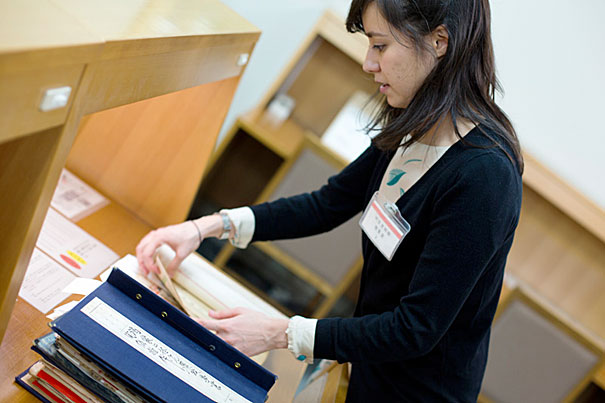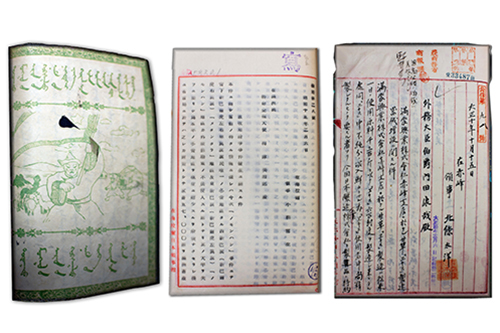|
Harvard
Gazzet |
|
April
5, 2013 |
|
|
|
|
|
Tumultuous times draw
history student Sakura Christmas
 |
|
|
Photos by Ned Brown/Harvard Staff
Sakura Christmas, a doctoral student from
Harvard’s History Department, is wrapping up
work in the archives and libraries of Tokyo and
headed for 10 months of study in Inner Mongolia,
an autonomous region in northern China that
spans much of China’s northern border. |
|
TOKYO — To Sakura
Christmas, borders are where the action is.
They
are messy places where worlds collide: people, cultures,
sometimes armies. And the symbols of change that they
signify tell us something important about the values of the
shifting societies, about what is retained, what is lost,
and how hard people fight to retain what they have. Borders
also say much about the new societies that emerge from
tumult.
“I’m
very much interested in cultural encounters and the meetings
between different sorts of people and societies,” Christmas
said. “Some of the issues I work on now — ethnic tensions,
land rights, informal imperialism — still resonate today,
especially in China.”
Christmas, a doctoral student from Harvard’s
History Department,
is wrapping up work in the archives and libraries of Tokyo
and headed for 10 months of study in Inner Mongolia, an
autonomous region in northern China that spans much of
China’s northern border.
Christmas’ work examines a complex place at a complex time.
She’s focusing on the early part of the last century, when
Han Chinese migrant farmers pushed into Inner Mongolia, then
only thinly occupied by Mongol herders and hunter-gatherers.
The farmers’ arrival touched off a scramble for land, a
situation that became more complex after 1931, when the
Japanese invaded northern China as part of the imperial
expansion that was prelude to World War II. The Japanese
divided Inner Mongolia into two puppet states, Manchukuo and
Mengjiang.
For
herdsmen, farmers, and even Japanese imperialists, land was
an issue, whether as a resource to farm, to graze sheep and
cattle on, or to mine. Land and the policies surrounding it,
Christmas decided, would provide a useful lens through which
to view the region, the people, and the times.
“It
sounds really boring when you say ‘land tenure,’ but it’s a
reconceptualization of the understanding of land and
territory,” Christmas said. “Much of my work is on … how
imperialism affects the daily lives of people in this
period.”
Christmas has spent a lot of time in archives and libraries
in recent years. She has searched through thousands of
documents, photographing or copying those she deemed
important. Her research has taken her to three Japanese
archives and four Japanese libraries, and has her gearing up
to spend the coming months in four far-flung archives in
Inner Mongolia.
In a
way, Christmas has been preparing for her work her whole
life. With a Japanese mother and an American father who
doesn’t speak Japanese, Christmas was raised at the border
of two cultures, learning to read, write, and speak Japanese
at home while growing up and attending high school in North
Carolina.
When
she arrived at Harvard in the fall of 2003, she was hungry
to learn more about Japan and East Asia. But studying Japan
by itself wasn’t satisfying for her. Regular visits to her
Japanese grandparents had made the country familiar to her,
and not that much different from her U.S. home.
Christmas was drawn instead to the region along China’s
northern border. She spent the summer after her sophomore
year on a fellowship that had her drawing political cartoons
— she’d always had an artistic bent — for a newspaper in
Mongolia, the nation landlocked between China and Russia.
After
her junior year she took a year off to study Japanese at
Kyoto University on a fellowship funded by the Japanese
government. Despite her informal training at home, she felt
she needed to improve her Japanese reading and writing
skills if she was to conduct research in the language.
 |
|
| Three documents
unearthed by Harvard doctoral student Sakura
Christmas during research at archives in Tokyo.
Christmas is conducting historical work there
and in China to shine light on the Japanese
empire’s expansion into China. Click on the
audio clips below to hear Christmas discuss the
documents and their significance to her work. |
|
|
|
|
| |
|
On her
return to Harvard, Christmas did her senior thesis on
Japan-occupied Manchuria, an area in Northeast China
encompassing part of Inner Mongolia. After graduating, she
spent a year teaching English in another part of China,
Xinjiang, an autonomous region north of Tibet, with the
nonprofit group Princeton in Asia. Christmas was there when
deadly rioting broke out in the restive region, and grew
concerned when some friends got caught up in it, though
thankfully they were unharmed.
Mark Elliott, the Mark Schwartz Professor of Chinese and
Inner Asian History, advised Christmas on her senior thesis
and later became, with Associate Professor of History
Ian Miller, an adviser on her doctoral thesis.
Elliott, who’s known Christmas for seven years now,
described her as energetic and cheerful, a good student who
works hard and takes advice, but who also has the ability to
balance advice against her own instincts. After receiving
her undergraduate degree, for example, Elliott knew
Christmas wanted to teach for a year in China. Since she was
interested in Manchuria, he suggested she go to Dalian, a
port city with clean air and a fascinating colonial history,
where people were known for having more liberal attitudes.
“Instead, she opted for Shihezi, a bleak oil town in
northern Xinjiang, where among her colleagues at the
university were Han intellectuals ‘exiled’ from teaching
posts in China proper,” Elliott said. “The increased tension
between Han and Uyghur populations in Xinjiang she witnessed
during her stay — which ended in street violence in Urumqi
in summer 2009 — made for a challenging year, to say the
least. But I’m sure she learned more from those experiences,
difficult as some of them were, than she would have had she
chosen the more comfortable environment.”
Christmas started her doctoral work in the fall of 2009 with
an idea of the time and place she wanted to study. Elliott
and Miller helped her settle on land as a focus for her
interest in the region.
“I
could narrow down the time, and roughly the place,”
Christmas said. “I knew I wanted to work on the borderlands
region in China and narrowed it down to the Japanese
occupation.”
In
addition to Japanese imperial policies and the day-to-day
use of land by herders and farmers, the emerging role of
science in measuring and analyzing land is also important,
Christmas said, so her work will include an examination of
the role of science, as well as environmental aspects such
as desertification from careless use.
“In
the broadest terms, she’s bringing the history of science
and environmental history together in a study of the
Japanese empire and its edges,” Miller said. “We have ample
studies about how empire functioned in colonial cities and
so on, but before Sakura we had little sense for what the
Japanese empire looked like from its edges. This is an
empire that, at its peak, reached from the Aleutian Islands
to Indonesia, from Pacific atolls to the steppes of
Manchuria and Mongolia. It is this last area that has
attracted Sakura’s attention, and it is among the least
studied components of the Japanese imperium, despite its
obvious strategic and economic importance.”
When
asked about key moments in her work, Christmas talks about
unearthing documents like the record of the 58,000 head of
livestock the Manchukuo puppet government bought from Mongol
herdsmen after losing a 1939 border battle with the Soviet
Union. The loss shifted the border, placing the herdsmen’s
winter grazing grounds in the Soviet Union. The Manchukuo
government decided it was better to pay for the sheep and
cattle than have people fighting over the grazing lands that
remained, but Christmas said that decision ignored the
central role that livestock played in the lives of
traditional herdsmen.
“For
me, they’re huge, but in the grand scheme of things, they’re
all very small eureka moments,” Christmas said of that and
other archival finds. “One thing I like about the archives
instead of the libraries is that there’s a surprise every
day. You have to recalibrate every day based on the
documents you find that day and how they’re going to change
your dissertation and the arguments you want to make.”
For
example, Christmas was originally going to include a chapter
on opium cultivation, but found that, because it is illegal,
people didn’t want to talk about it and documents were hard
to find. After turning up references to licorice extraction,
she substituted licorice for opium, as the story of licorice
in the region allowed her to cover much the same ground.
Licorice is found in the deep roots of the plant and its
harvest, if done carelessly, can lead to desertification in
a fragile, dry environment. In addition to environmental
impacts, Christmas will also examine the contrast of
licorice’s pre-invasion use as a traditional Chinese
medicine — used in root form for upset stomachs — and the
more industrial processing by Japan, which extracted the
essence from the roots and shipped it for use in soy sauce
and tobacco products.
As
Christmas was wrapping up her Tokyo research in late
February, she was looking forward to her stay in Inner
Mongolia. Practical concerns were for the moment trumping
worries about her research, as she still didn’t have an
apartment lined up and was hoping a teacher’s apartment
would become available.
While
the prospect of traveling alone to a place unfamiliar to
many in the United States might seem daunting to some, it
was something Christmas had done before. In fact, she was
anticipating getting some open time to begin writing while
she waited for permission to visit archives in the regional
capital of Hohhot and in the towns of Hailar, Qiqihar, and
Chifeng.
“Many
of these border regions [in the study area] are now settled,
but there are similar issues taking place in China today,”
Christmas said. “It may be the way Asia might be headed,
especially if we forget the past. History is never dead.” |





